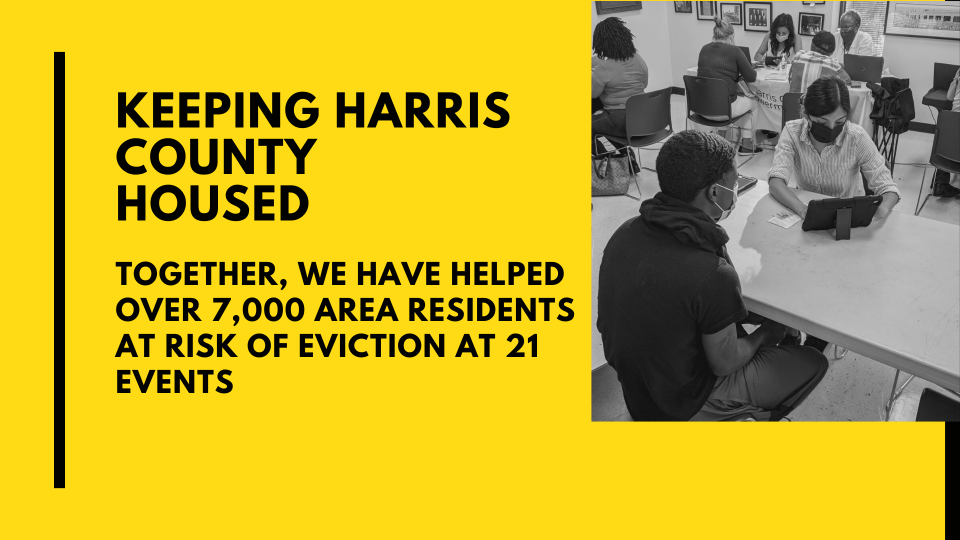Keep Harris County Housed
In the midst of a historic eviction crisis, the Texas Gulf Coast Area Labor Federation (the ALF) worked with a coalition of community allies and local leaders to organize 22 legal aid and rental assistance events to connect working people in Harris County at risk of eviction with the legal and financial resources they need to stay housed.
The eviction crisis in Harris County
Harris County is the epicenter of the COVID-19 eviction crisis, with more than 160,000 evictions filed since the start of the pandemic (as of March 2023), the highest in Texas and the second highest nationwide.
At the beginning of the pandemic, the Texas Supreme Court issued an order that essentially prevented evictions from moving forward across the state. This was in place from until May 26, 2020, when it was lifted. At that point, evictions began being heard in our courts again, until the federal government intervened in the fall.
In September 2020, the Centers for Disease Control (CDC) issued a limited eviction moratorium order. Most tenants were covered by the order, but in order to be protected from eviction, they had to fill out a legal form and submit it to their landlord. After the form was submitted, landlords were legally prohibited from beginning eviction proceedings, but in practice, many moved forward. And because the CDC did little to raise awareness of order, very few tenants knew they were protected — only 17% of eligible tenants in Harris County courts even filed the moratorium form.
This moratorium was implemented as a public health measure, but only prevented 12% of evictions in Harris County over the subsequent six months, mainly due to the requirement that protected tenants must fill out and submit complicated legal paperwork in order to be protected.
The CDC eviction moratorium was overturned by the US Supreme Court in August 2021. Since then, there have been no legal protections in place to protect renters economically impacted by the pandemic.
Labor’s role in the Eviction Crisis
After surveying affiliates at the beginning of the COVID-19 pandemic in March 2020, housing stability was identified as a top priority by local union leaders, with over 40% of ALF affiliates indicating that their members were already struggling to pay their rent. This was mainly due to early and severe layoffs in the hospitability, entertainment, and tradeshow industries, all of which saw nearly 100% unemployement.
In order to respond to this crisis, a coalition of local union affiliates and community allies convened by the ALF began meeting weekly to advocate for action by the City of Houston and Harris County. This coalition has been led by the International Union of Painters and Allied Trades (IUPAT) District Council 88, International Alliance of Theatrical State Employees (IATSE) Local 51 and 896, International Association of Fire Fighters (IAFF) Local 341, and International Association of Machinists (IAM) Lodge 811 with additional support from Service Employees International Union (SEIU) Texas.
After advocating at the City of Houston for months, the coalition had a breakthrough in January when the city passed a grace period ordinance. Affiliate members had been calling for this since April 2020. Unfortunately, coalition members were not consulted during the creation of the ordinance, which ultimately did little to strengthen existing protections for renters.
Connecting Working People with the Help They Need
Recognizing the challenges are tenants were having in utilizing the CDC order and the need for direct action, the coalition met with community allies and local leaders to plan a legal aid event on February 27th to help tenants fulfill the requirements to be protected against eviction.
Iupat District Council 88 and IATSE Local 896 took leadership roles in the planning of the event, which was convened by the ALF but included dozens of community partners. Union members from across the Gulf Coast also came out to support the effort. In total, 14 local union affiliates participated in the planning or volunteered on the day of the event, including Houston Federation of Teachers, Plumbers Local Union 68, IATSE Local 51, Houston Professional Fire Fighters Association, HOPE Local 123 (Houston Organization of Public Employees), CWA Local 6222, Texas State Employees Union (CWA Local 6186), Seafarers International Union of North America, AFL-CIO, Ironworkers Local 84 and Iron Workers Union 135.
Although the ALF convened the group to put the event together, logistics were covered by the offices of Harris County Commissioners Rodney Ellis and Adrian Garcia and the community relations teams at Harris County Precinct One and Harris County Precinct 2. They provided all of the technology and equipment (computers, printers, tents, tables, chairs, generators) and each office provided 15–20 staff members to support the event. The City of Houston Housing & Community Development team also provided 5 staff members, computers and printers, and printed informational flyers.
On February 27th, over thirty attorneys volunteered their time and expertise to help renters at risk. South Texas College of Law Houston, Houston Volunteer Lawyers, and Lone Star Legal Aid collaborated to recruit volunteers and also sent staff attorneys to help. In the end, they helped over 200 tenants to fill out and submit declaration forms to their landlords, nearly all of whom were at immediate risk of eviction in March.
In addition to government and legal aid partners, a diverse group of community groups also supported the event. These included FIEL Houston, The Metropolitan Organization — TMO Houston, Texas Housers, Houston DSA, The Anti-Eviction Network.
Starting in April 2021, the labor-led Keep Harris County Housed coalition began meeting weekly to plan mass applications events to help connect vulnerable tenants with rental assistance and legal aid. These events were coordinated between over 50 partner organizations, including unions, community groups, legal aid providers, churches, and government allies.
Between April and November, the coalition hosted 21 mass application events, helping over 7,000 area residents in total. The largest event was hosted at the IBEW 716 hall on August 2nd, where volunteers helped over 1,200 working people.
In addition, union volunteers and allies knocked over 40,000 doors in apartment complexes to get out the word about the events and protections and aid to help keep working people in their homes.
Additionally, we worked with County Judge KP George and faith groups in Fort Bend County to host 2 events in Stafford and Rosenberg, helping over 250 working people connect with rental assistance and legal aid.
Labor-Community Partnerships Yield Results
As the saying goes, the rent eats first. Without stable housing, it’s nearly impossible to live a stable life and provide for yourself and your family.
During the pandemic, we’ve heard from union members who have experienced homelessness, and the toll that has taken on them and their families. And there are tens of thousands of stories being told right now by working people across our state.
We have a responsibility to do all we can to help keep our neighbors housed during this crisis, and by partnering with community allies and local leaders, we can greatly expand the reach and impact of our efforts.





